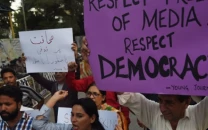Climate change and cooperation
Combined adverse effect of temperature and ill timed monsoon could have impact on agriculture and food security in SA.

Climate change and cooperation
The evidence is unmistakable: climate change is already occurring. South Asia with its delicately balanced ecology, its heavy reliance on monsoons, its critical dependence on agriculture and persistent mass poverty, is one of the most vulnerable regions in the world to climate change. Increased variability in the magnitude and timing of rain fall during the monsoons could increase the instability of agriculture production and add to the burden of the poor. The long and densely populated coastline with low lying islands, such as the Maldives, make the region vulnerable to sea level rise associated with global warming. The Himalayas containing the region’s glaciers, the source of its rivers, and the key to the region’s climate and economy, are highly sensitive to temperature increases. Srivastava provides evidence to show that some Himalayan glaciers are melting faster than the global average. This could have a critical impact on the stability of water supplies and, thereby, on the economy and society of the region.
The Intergovernmental Panel of Climate Change (IPCC) had predicted that global warming would increase the frequency and intensity of extreme climatic events. The study by Cruz et. al. (2007), provides data to show that this is indeed happening in South Asia. For example, the frequency of intense rainfall events has increased, causing floods and landslides in Pakistan, Bangladesh, Nepal, northeast India and Sri Lanka, during the last decade. Consecutive droughts in 1999 and 2000, in Pakistan and northwest India adversely affected agriculture growth and the drought of 2002 in Orissa (India) caused crop failures which affected 11 million people.
According to the IPCC, the increase in temperatures in South Asia in the decades ahead are likely to be above the global average. The study by Georgi and Bi (2005) suggests that higher temperatures will lead to increased year to year variability of monsoon rains. This combined with the adverse effect of temperature on heat sensitive varieties of food grains could have a critical impact on agriculture production and accentuate the problem of food security in South Asia.
Climate change is also likely to have a significant impact on health. The increased frequency and intensity of heat waves could increase the incidence of heat stroke, cardiovascular, cerebrovascular and respiratory diseases according to a recent study by Hales, Edward and Kovats. Furthermore, the increased frequency of floods could lead to increases in the incidence of diarrhea, dysentery, cholera, typhoid and rodent borne diseases.
As local communities across South Asia face a threat to their life and livelihoods due to climate change, large scale dislocation and migration of populations can be expected. Increased flooding and prolonged droughts could displace communities inhabiting the riverine plains; sea level rise would change the salinity profile of coastal areas, degrade large areas of fertile land and consequently displace the local communities which are dependent for their livelihoods on coastal plains. SC Rajan has estimated that climate change could force 125 million people to leave their habitat and migrate to other places in South Asia.
Managing population dislocation, natural disasters, instability of water supply and food shortages resulting from climate change, will require a high degree of interstate cooperation in South Asia. The integrated ecology of South Asia, its mountains, rivers, forests and top soils constitute the basis of sustaining its economy and social life. The nation states of this region share this integrated life support system. They also share the risks posed to it by climate change. Therefore, we the peoples of South Asia and our respective states, must cooperate and bring to bear our shared humanity and innovativeness to face the challenge of climate change. Cooperation, not conflict, is the key to building a better future for the people of South Asia.
Published in The Express Tribune, August 22nd, 2011.

















COMMENTS
Comments are moderated and generally will be posted if they are on-topic and not abusive.
For more information, please see our Comments FAQ